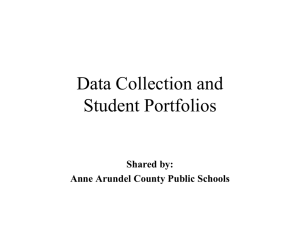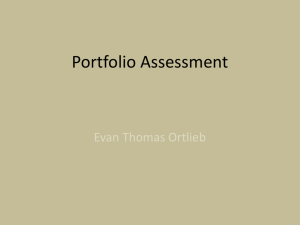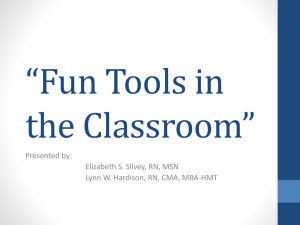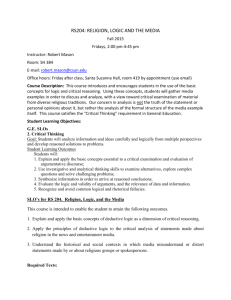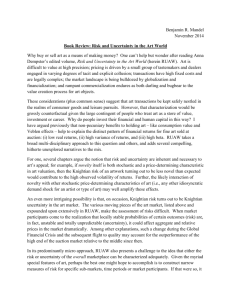Professional Writing Program Portfolio Assessment Heuristic
advertisement
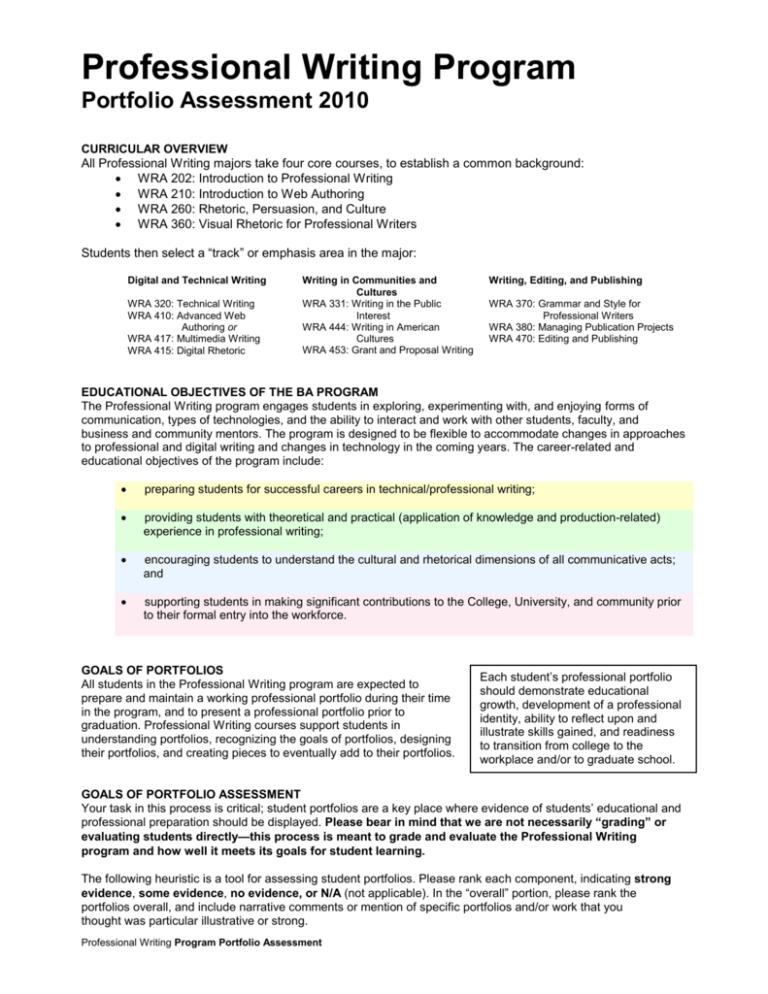
Professional Writing Program Portfolio Assessment 2010 CURRICULAR OVERVIEW All Professional Writing majors take four core courses, to establish a common background: WRA 202: Introduction to Professional Writing WRA 210: Introduction to Web Authoring WRA 260: Rhetoric, Persuasion, and Culture WRA 360: Visual Rhetoric for Professional Writers Students then select a “track” or emphasis area in the major: Digital and Technical Writing WRA 320: Technical Writing WRA 410: Advanced Web Authoring or WRA 417: Multimedia Writing WRA 415: Digital Rhetoric Writing in Communities and Cultures WRA 331: Writing in the Public Interest WRA 444: Writing in American Cultures WRA 453: Grant and Proposal Writing Writing, Editing, and Publishing WRA 370: Grammar and Style for Professional Writers WRA 380: Managing Publication Projects WRA 470: Editing and Publishing EDUCATIONAL OBJECTIVES OF THE BA PROGRAM The Professional Writing program engages students in exploring, experimenting with, and enjoying forms of communication, types of technologies, and the ability to interact and work with other students, faculty, and business and community mentors. The program is designed to be flexible to accommodate changes in approaches to professional and digital writing and changes in technology in the coming years. The career-related and educational objectives of the program include: preparing students for successful careers in technical/professional writing; providing students with theoretical and practical (application of knowledge and production-related) experience in professional writing; encouraging students to understand the cultural and rhetorical dimensions of all communicative acts; and supporting students in making significant contributions to the College, University, and community prior to their formal entry into the workforce. GOALS OF PORTFOLIOS All students in the Professional Writing program are expected to prepare and maintain a working professional portfolio during their time in the program, and to present a professional portfolio prior to graduation. Professional Writing courses support students in understanding portfolios, recognizing the goals of portfolios, designing their portfolios, and creating pieces to eventually add to their portfolios. Each student’s professional portfolio should demonstrate educational growth, development of a professional identity, ability to reflect upon and illustrate skills gained, and readiness to transition from college to the workplace and/or to graduate school. GOALS OF PORTFOLIO ASSESSMENT Your task in this process is critical; student portfolios are a key place where evidence of students’ educational and professional preparation should be displayed. Please bear in mind that we are not necessarily “grading” or evaluating students directly—this process is meant to grade and evaluate the Professional Writing program and how well it meets its goals for student learning. The following heuristic is a tool for assessing student portfolios. Please rank each component, indicating strong evidence, some evidence, no evidence, or N/A (not applicable). In the “overall” portion, please rank the portfolios overall, and include narrative comments or mention of specific portfolios and/or work that you thought was particular illustrative or strong. Professional Writing Program Portfolio Assessment Comments from evaluators should be submitted to the Director of Professional Writing no later than two weeks after students’ portfolio presentations (email is ideal, devossda@msu.edu). Comments will be combined and a written report will be prepared, available to faculty, CIAB members, and students; the report will be archived in the Professional Writing offices for program review and assessment. Thank you for your expertise and help in this process. If you are interested in reviewing the annual Professional Writing portfolio report, please contact the Director of Professional Writing. Professional Writing Program Portfolio Assessment REVIEWER: DATE: PORTFOLIO COMPONENTS Preparing students for successful careers in technical/professional writing. Strong Evidence Some Evidence No Evidenc e N/A Strong Evidence Some Evidence No Evidenc e N/A Strong Evidence Some Evidence No Evidence N/A Strong Evidence Some Evidence No Evidence The portfolios demonstrate evidence of educational and/or professional development and growth over time and/or projects. The portfolios include biography, philosophy, or objective statements that reflect the authors’ educational and/or professional purposes. The portfolios include resumes. The content of the portfolios complements and illustrates the resumes. Providing students with theoretical and practical (application of knowledge and production-related) experience in professional writing. The portfolios include evidence of students’ ability to write and produce different types of texts. The portfolios show evidence of the authors’ abilities to work productively and collaboratively with others (in pairs, in small groups, etc.). The design and layout present a unique and professional identity. The navigation and structure of the portfolios and their content are easily understandable and usable. Encouraging students to understanding the cultural and rhetorical dimensions of all communicative acts. The portfolios show evidence of the authors’ understanding of communication as a cultural and rhetorical act. The portfolios show attention to appropriate education and professional audience(s). The portfolios reflect the authors’ ability to understand historical and cultural context and their relevance to communicative acts in professional writing. Supporting students in making significant contributions to the College, University, and community prior to their formal entry into the workforce. The portfolios demonstrate engagement with and contributions to the Professional Writing program. The portfolios demonstrate engagement with and contributions to the university. The portfolios demonstrate engagement with and contributions to the larger community (Lansing, Michigan, etc.). Professional Writing Program Portfolio Assessment N/A Professional Writing Program Portfolio Assessment PORTFOLIO RATINGS In this final, summary section, please include both a rating for each category and also provide some narrative discussion to support your rating. Feel free to draw upon specific examples as necessary. Collection of materials. The portfolios show what the students can do; the portfolios include excellent selections of example materials. Strong Evidence Some Evidence No Evidence N/A Strong Evidence Some Evidence No Evidence N/A Comments: Selection of materials. The portfolios evidence excellent attention to detail and appropriate selection of key work. Comments Professional Writing Program Portfolio Assessment Reflection on materials. The portfolios show that the students have reflected on their skills and abilities, and well represented reflection across their portfolios. Strong Evidence Some Evidence No Evidence N/A Strong Evidence Some Evidence No Evidence N/A Strong Evidence Some Evidence No Evidence N/A Comments: Writing skills. The portfolios reveal the authors as sophisticated, creative, attentive writers of carefully edited and polished prose. Comments: Professionalism. The portfolios do an excellent job revealing a sense of the authors/writers/designers as individuals with unique skills and a professional identity. Comments: Professional Writing Program Portfolio Assessment
